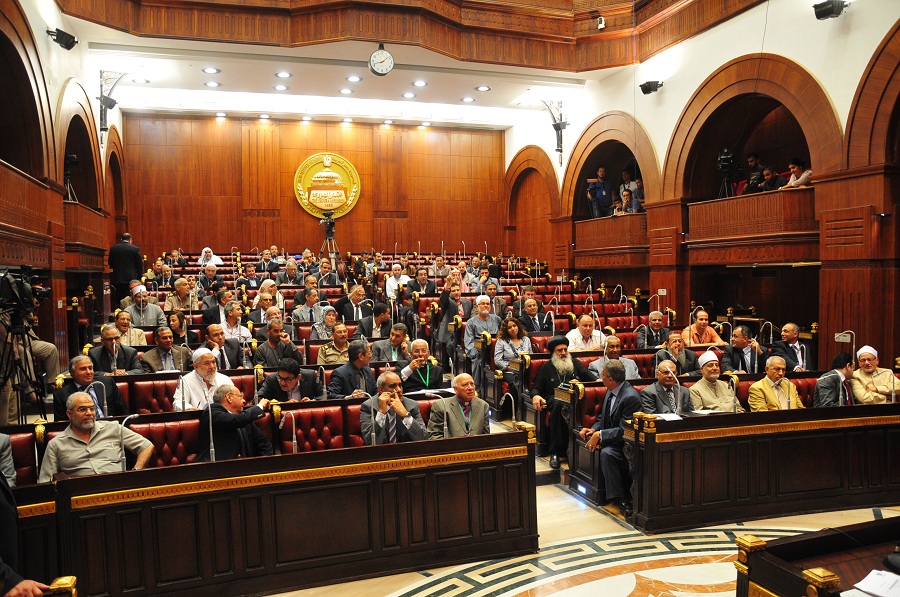
When Egyptians took to the polls in March 2011, those who voted ‘no’ did so not as a rejection of the proposed constitutional amendments but rather as a rejection of a process which prioritized elections ahead of a new constitution. This in turn was due to an objection against majoritarian control, brought about through elections, over the transitional period, and most importantly, over the draft constitution. With reality being what it is, majoritarian control in the absence of a constitution which governs the rules in the management of Egypt’s transitional phases has led to successive and varied crises. The crisis surrounding the Constituent Assembly’s drafting of the constitution (a crisis brought about mainly due to a majoritarian attitude in its formation), is not the last crisis Egypt will face.
The Constituent Assembly, its own members an example of a simple majority controlling the nation’s destiny and society, has enshrined this approach when it comes to the management of all affairs of the state. Article 225 in the constitution allows the draft to pass with a fifty percent (plus one) approval rate in the referendum.
The political system has been persistent in applying a majoritarian approach when it comes to administering state affairs, a practice which has been applied in a variety of ways. In voting, the majority can be defined in one of two ways: either constituting a simple majority of 50% of the voters, or a majority consisting of 75% of the voters. The latter, an exceptional measure, usually comes into play when considering significant political developments. The most prominent examples where this extraordinary measure is applied is when a new constitution is issued, or an existing constitution is amended. An example of this approach in practice can be seen with the constitution of the United States of America, which was ratified after the approval of 75% of the newly independent states. As a result, the US constitution has been one of the contributing factors ensuring the stability of the American state and its society for more than two centuries.
In this context, the actual text of Article 225 in Egypt’s draft constitution, which allows for the use of a simple majority vote, is problematic and could lead to further political instability in the country over the coming years. Using a simple majority as a requirement for the approval of a new constitution is in direct contradiction with the notion of consensus on the constitutional draft. A simple majority is perfectly acceptable when voting on changes in the government, or voting for parliamentary and presidential elections, as these are elections that take place periodically every few years, within the context of the devolution of power, and within a clear framework dictating the rules of organizing the state. It is not, however, acceptable for the same simple majority to be used when changing these very rules, in other words, when voting on the constitution.
The process used by the Constituent Assembly itself is in contradiction with the simple majority vote applied in the referendum. When voting (within the assembly) on individual articles, it was agreed that articles could not pass without a two-thirds (67%) majority vote. Why was a two-thirds majority vote used by the Constituent Assembly, and yet it was not applied to the popular vote on the constitution? Isn’t public approval of the constitutional draft a more important priority than the constituent assembly’s approval? (The latter not having actually happened in reality.)
Another contradiction between the process and the text of the constitution itself can be seen in Article 218. It states that amendments to the constitution will be approved with a two-thirds majority in the House of Representatives and Shura Council. This means that the drafters of the constitution decided that constitutional amendments, not the issuing of a new constitution, should require at least a two-thirds majority in the parliament. On the other hand, the ratification of a brand new constitution requires approval of only half of the voters, a contradiction that goes against all logic, and against the very provisions of the constitution.
Egypt’s new constitution will govern the country for decades to come, and its ratification should not come with less than a 75% approval rate. This is the minimum rate that would demonstrate the fact that members of Egyptian society succeeded in setting aside their differences, and achieved the minimum popular consent necessary for the new constitution. The preliminary results of the referendum currently taking place in Egypt indicate that a marginal majority will succeed in allowing the draft constitution to pass. This will serve only to further complicate the political situation in the country, with those rejecting the constitution aware that they are a significant percentage (40 to 50%) of the electorate, and that the simple majority is exercising an intolerable kind of dictatorship, the dictatorship of the majority.
Photo: DNE
Image: Constituent%20Assembly%20DNE_0.jpg
